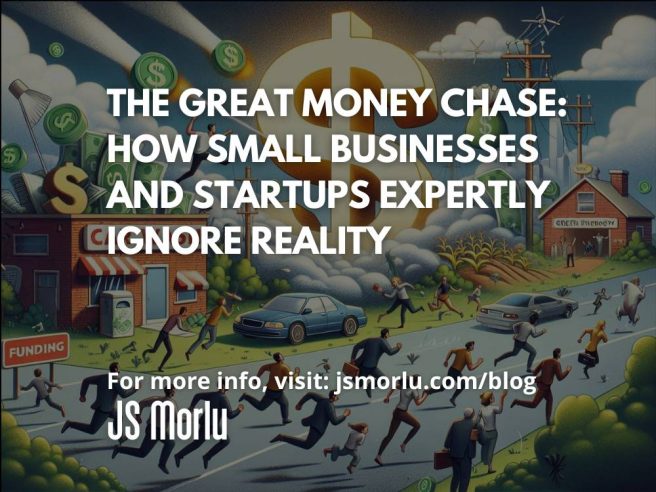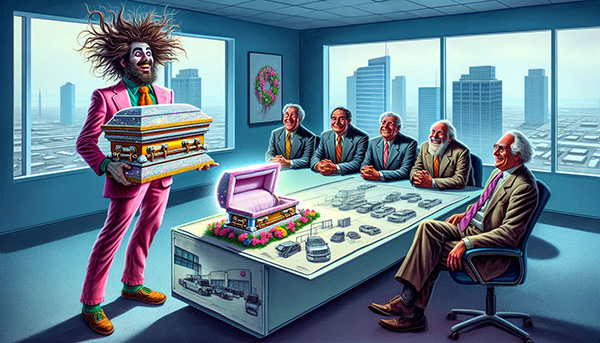By: John S. Morlu II, CPA
Once upon a time, in a land that looks suspiciously like our own, there lived a quirky tribe of small business owners and starry-eyed startup founders. These brave dreamers had visions so grand they could rival skyscrapers, but when it came to financial savvy, they were armed with little more than a foggy understanding of bank statements and the occasional Google search on “how to get rich fast.” With boundless optimism and only a vague sense of direction, they set out on the wildest of quests—to find money where none existed, and to pitch their half-baked ideas to people who couldn’t care less.
This isn’t a fairy tale, but it might as well be. In their relentless pursuit of cash, these entrepreneurs wandered into the boardrooms of private equity firms that specialized in old laundromats, knocked on the doors of banks that only loaned to farmers, and sent elaborate pitch decks to investors who couldn’t tell a tech startup from a taco stand. Common sense, if it ever existed, was nowhere to be found. The result? Rejection, confusion, and the occasional awkward silence.
Welcome to the world of misplaced financial hope, where ambition collides with cluelessness, and where the unshakable belief that “someone, somewhere, must want to give me money” reigns supreme. It’s a world where fantasy meets finance, business plans look more like wish lists, and common sense is little more than a faint echo in the background.
But why do these brave souls continue this endless chase? What drives them to ask for millions from investors who wouldn’t fund them a coffee? And how, despite the odds stacked so high against them, do they manage to keep dreaming bigger? Read on, as we dive into the misadventures of the hopelessly hopeful, and the often hilarious world of startups that knock on all the wrong doors in their desperate search for funding.
Chapter 1: The Misadventures of Dwayne Borrowmore and The Pet Funeral Folly
Dwayne Borrowmore was not just any ambitious man; he was the type of guy who believed he could sell ice to penguins if he really put his mind to it. With a heart full of dreams and a bank account that resembled a sad, deflated balloon, Dwayne concocted what he considered a groundbreaking business idea: Rent-A-Pet Funeral. Yes, you heard that right—a service dedicated to hosting memorial ceremonies for pets that, quite frankly, weren’t even yours to begin with.
His business model was a stroke of genius, or so he thought. “People love pets. People get sad when pets die. I solve this!” he often proclaimed, his eyes sparkling with the kind of fervor usually reserved for motivational speakers at a seminar called “How to Fail Spectacularly.” Dwayne envisioned tear-jerking send-offs for rented goldfish, elaborate ceremonies for borrowed hamsters, and perhaps even a royal procession for a temporary turtle that had briefly graced someone’s life.
Armed with his pitch deck—handcrafted, of course, with markers and glitter—Dwayne confidently marched into the Thorny Oaks Private Equity Fund, a fortress of finance known for rescuing distressed car washes. To Dwayne, the logic was flawless: they had money. What could possibly go wrong?
As he took a seat across from Chad Casherton III, the impeccably coiffed managing director, Dwayne felt a wave of optimism wash over him. Surely, Chad was just waiting to be dazzled by this innovative idea. “Chad,” he began, his voice dripping with excitement, “people are ready for Rent-A-Pet Funeral. It’s the Uber of pet funerals. Think about it! We’ll have services like ‘The Goldfish Glow-Up’ and ‘Hamster Heaven’!”
Chad’s expression was as blank as a Monday morning. “We focus on mature, struggling businesses like car washes that need operational turnaround, not, uh, whatever this is,” he replied, eyebrow arched in disbelief, as if Dwayne had suggested a funeral for a toaster.
Dwayne felt his heart sink faster than a lead balloon. “But, Chad! Just imagine the market potential!” he implored. “There’s a growing trend in pet ownership, and let’s not forget how people throw extravagant parties for their pets. Why not have a going-away party for the ones they rented?” He gestured passionately, picturing a grand event with tiny floral arrangements and a somber soundtrack of “Taps” played on a ukulele.
Chad leaned back in his chair, looking as though he had just bitten into a sour lemon. “Dwayne, let’s be real here. Private equity tends to invest in existing businesses. We’re not in the market for hamster coffins and biodegradable turtle headstones. You do realize that, right?”
As Dwayne left the meeting, confusion swirled in his mind like confetti in a windstorm. “Private equity is supposed to fund the next big thing,” he muttered, scratching his head. “Maybe Thorny Oaks just isn’t ready for pet funerals. They probably just don’t see the vision!”
The reality was that Dwayne had failed to grasp a simple truth: when it comes to funding, being imaginative is no substitute for practicality. And while he might have dreamed of hosting tearful tributes for rented pets, the investors in the room were more interested in turning around the fortunes of car washes that were one soapy scrub away from bankruptcy.
Despite his epic flop, Dwayne didn’t let the setback extinguish his entrepreneurial spirit. No, he was already drafting plans for his next venture: Rent-A-Lawn, a service that offered temporary grass for urban dwellers who missed the feeling of lush greenery underfoot. “It’ll be huge!” he declared to his cat, Mr. Whiskers, who seemed less than impressed.
As Dwayne prepared for his next meeting—this time with a lending institution specializing in underwater basket weaving—he couldn’t help but feel that the world just wasn’t ready for his brilliance. Little did he know, the real comedy lay not just in his business ideas, but in the age-old saga of entrepreneurs chasing dreams while running headlong into the brick wall of reality. And somewhere in the back of his mind, a small voice whispered, “Maybe it’s time to find a different kind of pet project.”
Chapter 2: Sarah Startup and The Series Z Misfire
On the other side of town, in a trendy co-working space filled with inspirational quotes and the lingering scent of organic coffee, Sarah Startup was poised to take the food world by storm. Her latest creation? EcoBacon—a plant-based bacon substitute made from algae. It was slimy, green, and tasted somewhere between seaweed and profound regret. But Sarah believed it was the future of breakfast foods. “Move over, pigs! It’s time for algae to shine!” she often declared, her enthusiasm bordering on manic.
Armed with a sample of her gooey concoction, which she lovingly referred to as “the future of breakfast innovation,” and her meticulously crafted pitch deck—complete with graphics that looked like a kindergarten art project—Sarah headed to Series Z Ventures. This firm was renowned for investing in companies preparing for IPOs, which sounded impressive enough to make her believe they would jump at the chance to fund EcoBacon.
As she walked into the sleek, glass-walled conference room, Sarah felt the familiar flutter of hope mixed with the slight dread of impending judgment. Marcus Mogul, the managing director at Series Z, lounged in his designer chair, sipping an artisanal oat milk latte that was likely sourced from a farm in the Himalayas. He looked like the kind of guy who could make even a bowl of kale seem appealing.
“So, what stage are you in?” he asked, raising an eyebrow while eyeing her sample, which sat in a jar labeled “Seaweed Surprise.”
“We’re pre-seed!” Sarah replied with confidence, thinking the term sounded futuristic and sophisticated, like something Elon Musk would say during a TED Talk.
Marcus leaned back, his expression shifting from mild curiosity to something resembling disappointment. “We invest in companies that are on their way to IPOs. We’re looking for unicorns, not seaweed startups with three customers. Where’s your Series A, B, or any evidence that people want to eat algae for breakfast?”
Sarah felt her confidence waver. “Well, um, we’re thinking about doing solar-powered algae farms one day,” she stammered, trying to sound like her vision was both revolutionary and eco-friendly. “That counts, right?”
Marcus sighed, a sound heavy with the weight of countless entrepreneurs who had come before her. “You need to find seed investors, not us. Go back to the alphabet’s beginning and start there. Your seaweed dreams aren’t ready for prime time.”
Stunned, Sarah exited the meeting, her head spinning like a blender set to high. “Seed investors?” she muttered, realization dawning. “You mean, I need to start at A before jumping to Z? Who knew this was a food chain and not an alphabet soup?”
Much like Dwayne with his Rent-A-Pet Funeral, Sarah had overlooked a crucial point: there’s a distinct difference between seed funding—where a fledgling idea gets a chance to grow—and Series Z investment, which is reserved for companies that are already thriving and primed for a public market debut.
As she walked home, cradling the jar of EcoBacon like a lost child, Sarah pondered her next steps. “Maybe I should consider a different angle. What about EcoBacon-flavored toothpaste? It’s innovative, right?”
Just as she was plotting her next entrepreneurial misfire, she overheard two hipsters in a café discussing the latest trend—“The algae movement is taking off! We need to get more algae in our lives!” Sarah perked up. “Aha! I just need to rebrand!”
She rushed home, firing up her laptop. “EcoBacon: Now with 50% more irony!” she typed, envisioning a world where her algae bacon could grace the plates of hip brunch spots and become the newest Instagram sensation.
In her fervor, she forgot about the meeting with her actual seed investor, who had promised to review her business plan. The irony was thick enough to cut with a knife. But in Sarah’s world, every misstep was just another opportunity to innovate. “Who needs clarity when you have creativity?” she declared, concocting new flavors in her mind, each more bizarre than the last—EcoBacon Surprise, EcoBacon Smoothies, and of course, EcoBacon Pizza, because nothing says ‘healthy living’ like a pizza topped with slimy algae.
In her journey through the whimsical world of startups, Sarah was about to discover that success often dances just out of reach, teasing her with every misadventure. Little did she know, she was about to embark on a comically chaotic quest that would lead her to unexpected revelations about funding, food, and what it really means to be an entrepreneur in the wild, wonderful world of startups.
Chapter 3: Lenny Lenderson and The Bank of Lost Causes
Lenny Lenderson was not your average mechanic; he was a man with a vision so grand it could make even the most seasoned inventors raise an eyebrow. His latest brainchild? The AutoChef—a revolutionary vehicle that doubled as a mobile kitchen. “People drive. People eat. Let’s combine them!” he proclaimed, as if he had just unlocked the secrets of the universe. Lenny envisioned a world where you could whip up pancakes on the freeway and grill burgers in the drive-thru lane. What could possibly go wrong?
Convinced he was on the brink of culinary history, Lenny strode into AgriFunds, a lender specializing in farm equipment, completely unaware that he had miscalculated his target audience. Sitting across from Martha, the no-nonsense loan officer with an expression that suggested she’d seen it all, Lenny felt the rush of adrenaline. This was it—his moment to shine.
“It’s a car… and a kitchen!” Lenny exclaimed, his eyes gleaming with enthusiasm. “You can make pancakes while driving to work! Farmers are always on the road, so this is technically farm equipment, right?”
Martha blinked, her face a mix of confusion and suppressed laughter. “Sir, we specialize in loans for tractors and irrigation systems. Not, um, pancake-making cars.”
Unfazed by the reality check, Lenny pressed on, his mind racing with delicious possibilities. “But imagine cooking eggs while you plow the field! It’s revolutionary! You could have breakfast on the go, and think of all the time farmers would save!”
Martha politely returned his loan application, her smile unwavering but tinged with a hint of sympathy. “Look, Lenny, I appreciate your creativity, but cooking while you plow is not exactly what AgriFunds had in mind. Have you considered a bank that specializes in automotive loans? They might be a better fit for your… culinary vehicle.”
As Lenny left the office, he couldn’t shake the feeling that he was on the verge of something truly great. “Maybe I just need to find the right audience,” he muttered to himself, envisioning farmers driving his AutoChef while flipping pancakes with one hand and steering with the other. The image was both hilarious and oddly endearing, but he remained blissfully unaware of the logistical nightmare it would entail.
Determined to make his idea a reality, Lenny decided to try a different approach. He set off for Bet-the-Farm Bank, a quirky establishment known for their unique loan offerings. After all, who could resist a pitch about a car that cooked while you drove? The possibilities seemed endless!
When he finally made it to Bet-the-Farm, he found himself in a meeting with Barry Blunderbuss, the bank’s eccentric owner who was notorious for funding the most outrageous projects. “Lenny, my friend! Tell me, what wild idea have you brought me today?” Barry exclaimed, his eyes sparkling with mischief.
“Barry, I’ve invented the AutoChef! A car that cooks! Just picture it—a mobile kitchen for farmers!” Lenny said, animatedly gesturing with his hands as if he were stirring a pot of spaghetti.
Barry stroked his beard thoughtfully, a grin creeping across his face. “I love it! I mean, who wouldn’t want to make a five-course meal while driving to the cornfield? This is exactly the kind of absurdity we thrive on!”
Lenny’s heart soared. Finally, he was talking to someone who understood the genius behind cooking while commuting. He launched into a passionate explanation of the AutoChef’s features, from the pancake griddle in the glove compartment to the fold-out oven in the trunk.
As Lenny painted a vivid picture of culinary chaos on wheels, Barry couldn’t help but chuckle. “You know, this could actually work! Think about all those farming conventions where people just sit around eating cold sandwiches. With your AutoChef, they could have gourmet meals on the go!”
However, just as Lenny thought he was about to secure the funding he desperately needed, Barry raised an eyebrow. “But… can it pull a plow?”
“What?” Lenny stammered, momentarily flabbergasted. “No, it’s a car!”
Barry leaned back in his chair, a twinkle in his eye. “Then I’m afraid we have a problem. What good is a cooking car if it can’t plow fields? Farmers need functionality, my friend!”
Dejected, Lenny left Bet-the-Farm with his culinary dreams dashed yet again. The irony of it all was almost too much to bear: his revolutionary AutoChef was a hit with every eccentric banker except those who could actually fund it.
As he walked home, he pondered the absurdity of his journey. “Maybe I should just open a food truck,” he mused. “But then again, it wouldn’t be a mobile kitchen. Just a truck.”
He chuckled at the thought of driving a regular food truck while dreaming of a world where breakfast could be prepared at 70 miles per hour. Somewhere, buried deep in his heart, Lenny knew that the road to success was paved with misadventures, bizarre meetings, and a whole lot of culinary creativity.
And while he might not have found the right bank, he certainly had plenty of ideas—each more ludicrous than the last. As he stared at the jar of maple syrup he had brought along for inspiration, he made a silent vow: One day, the world would know the joy of breakfast on the go. Little did he know, the next leg of his journey would lead him to even more hilariously misguided funding attempts, where breakfast would collide with banking in the most unexpected ways.
Chapter 4: Tina Techbro and The Bearded Blunder
Meanwhile, in the bustling realm of Silicon Alley, where dreams are built on Wi-Fi signals and caffeine, Tina Techbro was on a mission. She had developed an app called BeardSwap, designed for trading beard-care products. With a user base of exactly three—her boyfriend, her cat (who sported a mysteriously luscious beard), and Jerry from Minnesota, a dedicated enthusiast with a collection of 45 beard combs—Tina was convinced her creation could revolutionize male grooming. After all, who wouldn’t want to trade artisanal beard oils in exchange for handcrafted mustache wax?
Fueled by confidence and a couple of cold brews, Tina set her sights on Sustainable Capital Fund, a prestigious firm known for pouring money into green energy projects. “This is it,” she thought, adjusting her oversized glasses and flipping her hair as she strode into their kombucha-scented office, a place where the air practically hummed with optimism (and a faint hint of algae).
Greg Greenfield, the head of Sustainable Capital, sat across from Tina, looking like he had just stepped out of a solar panel ad. “So, how does BeardSwap align with our mission of fighting climate change?” he asked, raising an eyebrow as he sipped his kale-infused green smoothie.
Tina, unfazed, leaned forward earnestly. “Well, Greg, beards are renewable! Think about it—hair grows back! And eventually, our app will be solar-powered, so it’s basically sustainable!”
Greg sighed, the weight of his responsibilities evident on his face. “We focus on renewable energy—solar panels, electric vehicles, and recycling initiatives. Beards… are not really our thing. You need to find a consumer goods investor who specializes in grooming products, not sustainability.”
As Tina left the meeting, she couldn’t shake the feeling of confusion. “I don’t understand,” she muttered under her breath, her heart heavy with disappointment. “Beard oil is practically an essential resource!” It was a classic case of assuming all investors wanted to fund the next big thing, even if that thing involved trading lavender-infused beard wax.
Determined not to give up, Tina decided to pivot her pitch. “Maybe I just need to rebrand!” she declared, staring at her phone as if it held the secrets of the universe. She envisioned a slogan: “BeardSwap: Saving the Planet, One Mustache at a Time!” It was brilliant, and she could almost see the investors lining up.
With her new marketing strategy in mind, she headed to Investors Who Actually Get It, a local firm rumored to back the weirdest ideas imaginable. Upon entering their graffiti-laden office, she was met by Frank Flannel, a scruffy investor with a penchant for plaid and an unsettling number of beaded bracelets.
“BeardSwap, huh?” Frank said, leaning back in his chair as he scrutinized Tina with a grin that suggested he had just emerged from a creative brainstorming session involving herbal tea and questionable snacks. “Tell me, how does it work?”
Tina launched into her pitch, highlighting the innovative trading platform, user interface, and the potential for a community of beard enthusiasts to connect. “It’s like eBay for beards!” she exclaimed, excitement bubbling in her voice.
Frank rubbed his chin, a thoughtful gesture that took on an entirely different meaning in a room full of beard products. “And what’s your revenue model?”
“Uh… trading fees?” she ventured, unsure. “And eventually, we could have premium memberships for exclusive beard oil access!”
Frank raised an eyebrow. “How do you plan to monetize that? Will you offer a subscription box of seasonal beard products? Because if you do, I’m in. I’ve been known to support a good grooming regimen.”
As they discussed potential growth strategies, it became clear that Frank was completely captivated by the idea of BeardSwap. He pulled out a colorful pie chart that he had likely doodled during a meeting and explained the importance of niche markets. “People are passionate about their beards! Look at the popularity of beard contests and grooming expos. You’re onto something, Tina!”
Tina’s heart soared. Finally, someone who understood the beauty and importance of the bearded community! With renewed energy, she and Frank brainstormed wild ideas, from beard-themed festivals to a reality show titled The Bearded Bachelor, where contestants would compete for love while showing off their facial hair grooming skills.
But just as she thought things were looking up, Frank leaned in closer and said, “Now, we just have to consider how to scale this beyond your three users.”
Tina’s face fell. “Wait, you mean… I need more than just my boyfriend, my cat, and Jerry?”
“Yes,” Frank chuckled, “unless you’re planning on launching a cat grooming app as a spinoff.”
Feeling slightly dazed, Tina left the meeting with a sense of hope mixed with confusion. She had gained a quirky investor, but she also realized the mountain of work ahead to transform BeardSwap from a three-user niche into a thriving platform. Yet, one thing was for sure: she wasn’t going to give up.
She decided to tap into the one resource she hadn’t considered: her cat. Perhaps Mr. Whiskers could become the furry face of her brand—BeardSwap: Where Cats and Beards Unite!
As Tina plotted her next moves, she couldn’t help but laugh at the absurdity of her journey. Who would have thought that a simple idea about trading beard-care products could lead her down such a wild path? With each setback, she gained a little more insight into the world of funding and investment. Maybe the next meeting would yield the kind of investor who truly appreciated the magic of beards—or at the very least, one who wouldn’t confuse her app with a renewable energy initiative.
Tina Techbro was determined, and she was ready to embrace whatever bearded adventure lay ahead. After all, in the realm of startups, a little humor and a lot of persistence often paved the road to success—or at least, a decent meme.
Chapter 5: The Great Moral of the Money Chase
What do Dwayne, Sarah, Lenny, and Tina have in common? Beyond their questionable taste in business ideas and the uncanny ability to overlook obvious red flags, they all made the same crucial mistake: they didn’t do their homework. These bright-eyed entrepreneurs charged headfirst into meetings with investors and lenders who had about as much interest—or expertise—in their industries as a goldfish in a physics lecture.
Dwayne Borrowmore, armed with dreams of a pet funeral empire, didn’t grasp that private equity firms like Thorny Oaks prefer existing businesses over whimsical ideas about deceased rented hamsters. Sarah Startup, with her ambitious plans for EcoBacon, seemed to forget that Series Z Ventures is only interested in billion-dollar unicorns, not algae-based bacon experiments still in the testing phase—specifically, the phase where three customers all complain about the taste.
Lenny Lenderson never realized that farm equipment lenders like AgriFunds wouldn’t be eager to finance pancake-making cars. “Imagine cooking eggs while you plow!” might not have been the selling point he thought it was. And Tina Techbro? Well, she confidently believed that sustainable energy funds would jump at the chance to fund beard products simply because they’re “renewable.” Because, of course, beards grow back, much like investments that go terribly wrong.
Here’s a fun fact for those keeping score: according to a study by Comically Inept Business Decisions Inc., a whopping 90% of startups waste months pitching to investors who aren’t remotely interested in their industry. Yet, these spirited entrepreneurs persist, convinced that sheer enthusiasm and a flashy PowerPoint can charm any investor into parting with their cash. Spoiler alert: it usually doesn’t work that way.
If there’s one critical lesson to be learned here, it’s this: not all money is created equal. Entrepreneurs, for the love of all things financially sound, please do your research! Find out if your potential investor funds companies at your stage or in your sector. Don’t waltz into AgriFunds expecting to get a loan for your sushi restaurant, nor should you ask Series Z for millions when you’re still trying to perfect your algae bacon recipe, which, let’s be honest, was likely doomed from the start.
In the end, our intrepid quartet—Dwayne, Sarah, Lenny, and Tina—returned home empty-handed but somehow much wiser. Their businesses may not have survived the rollercoaster ride of misguided funding attempts, but their stories live on as timeless examples of what not to do when seeking financial backing. They became legends in their own right, cautionary tales whispered at startup meetups, accompanied by nervous laughter and wide-eyed disbelief.
The moral of their misadventures? Don’t just run toward money—open your eyes, Google your investors, and for the love of all things financially sound, do your homework. Because even the best ideas are destined to fail if you ask the wrong people to fund them. Or if those ideas involve hamster funerals, algae bacon, and bearded cats.
So, take a page from Dwayne, Sarah, Lenny, and Tina’s playbook—or better yet, throw that book out and start fresh. Maybe invest in a coffee shop for over-caffeinated entrepreneurs or a consultancy that helps people identify the right funding sources. Just remember: knowledge is power, and in the wild world of startups, being well-informed is the difference between hitting a home run and striking out spectacularly, all while looking like you just stepped out of a comedy sketch.
And as for Dwayne’s pet funeral dreams? Well, let’s just say that if there’s a market for pet pampering in the afterlife, it’s probably best left to someone who knows the difference between a hamster and a horse. After all, nobody wants a rodent-sized coffin in a dog park.
Author: John S. Morlu II, CPA is the CEO and Chief Strategist of JS Morlu, leads a globally recognized public accounting and management consultancy firm. Under his visionary leadership, JS Morlu has become a pioneer in developing cutting-edge technologies across B2B, B2C, P2P, and B2G verticals. The firm’s groundbreaking innovations include AI-powered reconciliation software (ReckSoft.com) and advanced cloud accounting solutions (FinovatePro.com), setting new industry standards for efficiency, accuracy, and technological excellence.
JS Morlu LLC is a top-tier accounting firm based in Woodbridge, Virginia, with a team of highly experienced and qualified CPAs and business advisors. We are dedicated to providing comprehensive accounting, tax, and business advisory services to clients throughout the Washington, D.C. Metro Area and the surrounding regions. With over a decade of experience, we have cultivated a deep understanding of our clients’ needs and aspirations. We recognize that our clients seek more than just value-added accounting services; they seek a trusted partner who can guide them towards achieving their business goals and personal financial well-being.
Talk to us || What our clients says about us






